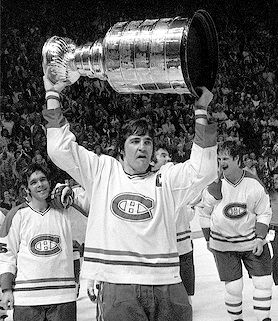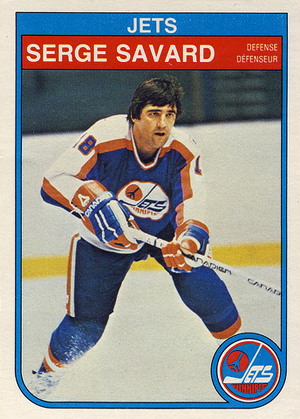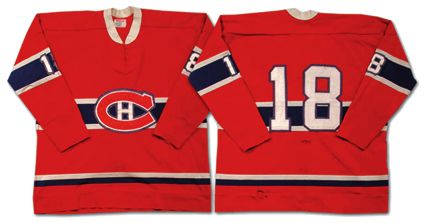Sunday, May 4, 2014
1970-71 Montreal Canadiens Serge Savard Jersey
When the NHL expanded for the 1967-68 season, each of the six new expansion clubs were placed in the West Division with the Original Six teams comprising the East Division. The playoff format was divided between East and West, guaranteeing that an expansion club would appear in the Stanley Cup Finals, and essentially guaranteeing that the East Division playoff finals would decide who would go on to be Stanley Cup champion against the weaker West Division survivor.
Such was the disparity in talent that the expansion club with the most points that first season was the Philadelphia Flyers with 73 points, which would have only been good for sixth place in the East. Additionally, all of the top ten scorers, as were the assists leaders, were players from the East Division, as they regularly loaded up on points while playing games against teams from the West. Nine of the top ten goal scorers came from the East as well, with only Wayne Connelly of the Minnesota North Stars and his 35 goals, tying for fourth, putting a dent in the dominance of the old guard.
Players from the Original Six teams also won every individual post season award and occupied all 12 places on the First and Second Team All-Star Teams.
Predictably, the Montreal Canadiens swept the expansion St. Louis Blues in four straight games to win the Stanley Cup.
1968-69 saw the newcomers make some inroads into the dominance of the established teams. The St. Louis Blues 88 points would have placed them fourth in the East while their leading scorer Red Berenson broke into the top ten in scoring. Two players from the West cracked the top ten in assists and three Western players made the top ten in goals.
The playoff format was again divided with the East playoff winner meeting the surviving "second six" club from the West. Overall regular season points leader Montreal defeated Boston for the right to again sweep St. Louis in the Stanley Cup Finals.
Montreal would win Game 1 and Game 2 at home by identical 3-1 scores. The series moved to St. Louis for Game 3, which Montreal dominated 4-0 before clinching he cup with a 2-1 win in Game 4. It was Montreal's fourth Stanley Cup in five years.
Serge Savard was named the winner of the Conn Smythe Trophy one this date in 1969, becoming the first defenseman to win the award. To date, less than ten defensemen have ever won the Conn Smythe, with Scott Niedermayer being the most recent in 2007. Only Bobby Orr has won it more than once from the blueline, with him being named the recipient in 1970 and again in 1972.
The divisional and playoff formats would remain the same for a third season, with St. Louis being swept in the finals all three years before change arrived in 1970-71 with the arrival of the Vancouver Canucks and Buffalo Sabres to the league. Buffalo and Vancouver were placed in the East Division with the Rangers, Bruins, Canadiens, Maple Leafs and Red Wings, while the Black Hawks were moved to the West Division with the "second six", which they won by a clear 20 point margin.
The playoff format was also improved, with the top remaining team in the West facing the lowest surviving East team, and the top remaining East team crossing over to face the remaining lower West team in the semi-finals. This meant the East Division Finals were no longer the de facto Stanley Cup Championship. While Original Six teams would still meet in the finals for the next three seasons, there were no more sweeps in the finals for the next five years.
Savard joined he Canadiens for a pair of games in 1966-67 before becoming a full-time member of the team in 1967-68, a season in which he would win his first Stanley Cup, which Montreal accomplished in 13 games, one over the then minimum of the required 12 victories.
1968-69 saw Savard increase his games played from 67 to 74 (in a 76 game season), scoring 31 points from the blueline. During the playoffs, he would add another 10 points in 14 games and be named the winner of the Conn Smythe Trophy, the first defenseman so honored.
He would continue to play for 17 NHL seasons, winning eight Stanley Cups in all, including four in a row from 1976 to 1979.
He was also named the winner of the Masterton Trophy in 1979. Savard had the distinction of being named the Canadiens captain for the 1979-80 and 1980-81 seasons. Often forgotten is the fact Savard actually finished his career with two seasons with the Winnipeg Jets after their entry into the NHL.
Savard was inducted into the Hockey Hall of Fame in 1986 and had his number 18 retired by the Montreal Canadiens on November 18, 2006.
Today's featured jersey is a 1970-71 Montreal Canadiens Serge Savard jersey. This jersey features a lace up collar and has the sleeve numbers contained within the blue arm stripe, which Montreal did from 1966 to 1978.
This particular style with the lace up collar and sleeve number placement was used from 1966-67 to 1974-75 until the Canadiens changed to a v-neck collar.
Notice the back numbers are not centered on the blue chest stripe, a common misconception with Canadiens jerseys.
Our first video today is a tribute to Savard on the occasion of having his #18 retired by the Canadiens.
Here, Savard's #18 raises to the rafters later in the ceremony. Notice the current Canadiens players all wearing #18 Savard captain's jerseys with a special commemorative patch for the occasion.
Labels:
Montreal Canadiens,
Savard Serge
Subscribe to:
Post Comments (Atom)














No comments:
Post a Comment
We welcome and encourage genuine comments and corrections from our readers. Please no spam. It will not be approved and never seen.